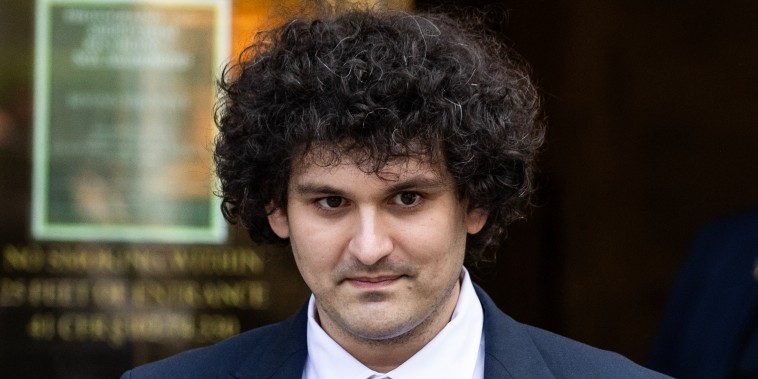
Sam Bankman-Fried sentenced to 25 years in prison for orchestrating FTX fraud

Sam Bankman-Fried was sentenced Thursday to 25 years in prison for his role in defrauding users of the collapsed cryptocurrency exchange FTX.
In a federal courtroom in lower Manhattan, U.S. District Judge Lewis Kaplan called the defense argument misleading, logically flawed and speculative.
He said Bankman-Fried had obstructed justice and tampered with witnesses in mounting his defense — something Kaplan said he weighed in his sentencing decision.
Bankman-Fried, wearing a beige jailhouse jumpsuit, struck an apologetic tone, saying he had made a series of ‘selfish’ decisions while leading FTX and ‘threw it all away.’
‘It haunts me every day,’ he said in his statement.
Prosecutors had sought as much as 50 years, while Bankman-Fried’s legal team argued for no more than 6½ years. He was convicted on seven criminal counts in November and had been held at the Metropolitan Detention Center in Brooklyn since.
In a statement following Thursday’s sentencing, Damian Williams, the U.S. attorney for the Southern District of New York, said Bankman-Fried had orchestrated one of the largest frauds in financial history.
“Today’s sentence will prevent the defendant from ever again committing fraud and is an important message to others who might be tempted to engage in financial crimes that justice will be swift, and the consequences will be severe,” he said.
Attorney General Merrick Garland said in a statement that there are “serious consequences for defrauding customers and investors.”
“Anyone who believes they can hide their financial crimes behind wealth and power, or behind a shiny new thing they claim no one else is smart enough to understand, should think twice,’ he said.
Bankman-Fried plans to appeal both the conviction and the sentence. A spokesperson for his parents said in a statement on their behalf: “We are heartbroken and will continue to fight for our son.”
Bankman-Fried’s lawyers had pleaded for leniency, citing what they described as mental health struggles and his purported generosity in his personal life. They also argued that FTX users had not ultimately suffered substantial losses — something current FTX administrator John Ray said was false in a letter to Kaplan in advance of Thursday’s sentencing.
But prosecutors argued the brazenness of the crime, the extent of the victims’ losses and damages and Bankman-Fried’s evident lack of remorse meant a harsher sentence was warranted.
Late Tuesday, prosecutors filed documents from victims testifying about how Bankman-Fried’s actions had harmed them.
“My whole life has been destroyed,” wrote one, whose name was redacted, in a letter dated March 15. “I have 2 young children, one born right before the collapse. I still remember the weeks following where I would stare blankly into their eyes, completely empty inside knowing their futures have been stolen through no fault of our own. I did not gamble on crypto. I did not make any crypto gains. I had my [bitcoin] which I had collected over years deposited on FTX as a custodian. I did not agree to the risk that SBF took with my funds.”
The man added he was suffering from depression and that his wife had become suicidal.
“I know we can never make that kind of money back ever again,” he wrote.
Another person wrote about how the loss of funds had affected numerous life plans, including a wedding.
“Each passing day is a painful reminder of the opportunities stolen from me, compounding feelings of hopelessness and despair,’ the person wrote. ‘The burden of financial ruin weighs heavily on my shoulders, leading me to grapple with constant thoughts of suicide and significantly impairing my ability to perform at work.”
In the recent annals of white-collar crime, Bankman-Fried’s sentence is similar to what others found guilty have received. Former WorldCom CEO Bernie Ebbers received 25 years. Former Enron CEO Jeff Skilling received 24 years.
Theranos founder Elizabeth Holmes received about 11 years. Bernie Madoff received 150 years and died in prison at age 82.
FTX was once valued at more than $30 billion, with Bankman-Fried’s net worth estimated at more than $20 billion. FTX collapsed in November 2022 after it was revealed that it had a major cash shortfall.
At his trial, prosecutors said Bankman-Fried robbed FTX customers of as much as $8 billion to fund a vast array of outside interests, including political initiatives, speculative investments and funding of FTX executives’ lifestyles.
Three other FTX executives testified against him.
Bankman-Fried “didn’t bargain for his three loyal deputies taking that stand and telling you the truth: that he was the one with the plan, the motive and the greed to raid FTX customer deposits — billions and billions of dollars — to give himself money, power, influence. He thought the rules did not apply to him. He thought that he could get away with it,” Assistant U.S. Attorney Danielle Sassoon told the jury.
Bankman-Fried’s defense argued that he was merely borrowing the funds to run his Alameda Research investment group, which he believed was allowed, and that he was unaware of how much debt he had racked up.
He said he “made a number of small mistakes and a number of larger mistakes.’
Yet many experts agreed Bankman-Fried came across as an unsympathetic figure. Paul Tuchmann, a former federal prosecutor who is now a partner with Wiggin and Dana LLP, told CNBC that Bankman-Fried’s testimony had been ‘unpersuasive’ and noted it took the jury only three hours to convict him on each count.
Trial attorney James Koutoulas said in an CNBC interview, “No one had a shred of support for SBF, nor should they have.”
The U.S. Bureau of Prisons will consider which federal penitentiary to send him to.
